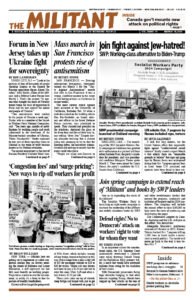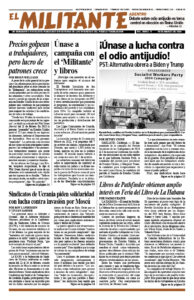March 22, 1999
CHICAGO — Federal prosecutors finished presenting their case in the frame-up trial of Puerto Rican independence activist José Solís Jordán here March 8. Solís faces charges in connection with the placing of two bombs outside a military recruitment center. The maximum sentence, if convicted, is 55 years in prison and $800,000 in fines.
The government’s central witness is Rafael Marrero, a paid FBI collaborator. The only “evidence” presented to link Solís to the attempted bombing is a tape recording made by Marrero when he wore a concealed wire to dinner with Solís in a restaurant in Puerto Rico. The voices are mostly unintelligible. What can be heard on the tape is mostly in Spanish, while the jury is English-speaking.
Solís was arrested, Nov. 6, 1997. He was interrogated for more than five hours before he was allowed to speak to his lawyer.
March 22, 1974
OCEANA, W.Va. — Striking miners here are determined not to compromise on their demand for more gasoline. ‘We know that they’ve got the gas,” said one striker. “We don’t believe we have this energy crisis.” Twenty-six thousand miners remained out, idling mines in five counties.
No car with more than a quarter tank of fuel can get gasoline. Many miners travel 50 or 60 miles one way to work, over mountainous roads with few gas stations. The strikers, members of the United Mine Workers of America, are demanding that all limits on gasoline purchases be lifted. Their strike began two weeks ago and spread quickly through the use of roving pickets.
A striker pointed to the recent truckers’ strike. “Maybe we should have come out with them. Maybe that way we could have been getting gas. If we had gotten together we could have supported each other.”
March 21, 1949
TRENTON, N.J. — An unmatched tale of police brutality, stony justice and race hatred surrounds six men who sit in a dreary Trenton cell. They are charged with a murder they could not have committed. They were indicted by a Trenton press, which rendered its verdict the day the men were arrested. They were convicted by an all-white jury on the basis of confessions some never remember having seen.
Witnesses had agreed that two men killed William Horner, and the police had arrested six. Witnesses had agreed that the two men were either white or light-skinned Negroes, and these men were dark-skinned. Every one of the six men had a perfect alibi.
Today the “Trenton Six” languish in the death house, awaiting action on their appeal.
For them life or death depends on the amount of mass protest that can be aroused to prevent this legal lynching.

